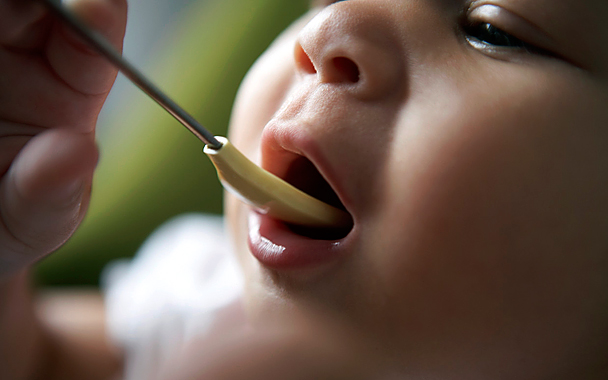For someone who loves food, could there be a more exciting moment than giving her baby that first spoonful of the real thing? I had dreamed of it before my son was born, and I had countless fantasies of the event in anticipation: Franklin in his high chair looking excited; me with a lovely little bowl of mashed sweet potato, or pink applesauce, or something else gem-colored; and him clapping his hands and smacking his lips, looking eagerly for the next bite.
I so wanted to get the moment right, I even researched which book to use for research. And after reading Ellyn Satter’s classic, Child of Mine, I thought that I knew everything there was to know—certainly, in my warm, encouraging-but-not-pushy presence, my baby would be just beside himself with joy to eat from that tiny spoon.
Satter’s philosophy is to only put a spoonful of food in the baby’s mouth when he appears to be a willing participant—making eye contact with the feeder, or at least the spoon, and opening his mouth—rather than trying to cajole or fool him into eating the way most of us probably did as infants, with airplane spoons and momentarily open mouths jammed with puréed peas. Satter’s method theoretically encourages a healthy relationship with eating: The child is allowed to eat until satisfied, and then allowed to stop, and doesn’t have to take any mouthfuls he doesn’t want, so no battles between parent and child can sabotage everyone’s enjoyment at the table. It sounded wonderful.
“If you are feeding a baby and he is excited and wants to eat fast, you feed him fast, and probably even express back to him some of his pleasure and excitement in eating. He opens his mouth and you put food in. He takes a minute to rest and you wait to offer food until he again opens up. The two of you are on the same wavelength, and you are both having a good time.” Yes. Sign me up.
So you can imagine my surprise when the big moment was over almost as soon as it began. I offered a spoonful of rice cereal—the recommended first food— he took it, and then refused to open his mouth again. I sat there chatting with him, showed him the spoon a few more times—nothing. I tried not to be disappointed as we washed the cereal down the drain. And, as this scenario repeated itself for days, then weeks, afterwards, sometimes with even that first bite refused, I tried to keep my nervousness in check. The tips started to trickle in from people around me: “Pretend you’re eating some,” they said. “He doesn’t know it’s food yet—just shove it in.” At our six-month checkup, the pediatrician remarked, “Still not eating? Start trying other foods, then—anything.”
I didn’t like the sound of moving on before we had mastered Step 1. Wouldn’t that be already capitulating to the whims of a baby who didn’t know better? Or worse, make each subsequent step even more difficult? I referred back to Satter’s book regularly for encouragement. But whenever I was in the moment, faced with a bowl of cereal and a baby who couldn’t care less, the advice from the book fell away and the voices in my head started shouting at each other. “Oh, just shove it in!” yelled one. “No, give him time!” yelled another one right back.
I couldn’t go on like this. So I did what any other neurotic mother would do: I phoned Ellyn Satter.
Within moments, I felt like I was on the psychiatrist’s couch. “Let me ask you this,” Ellyn said. “What’s the urgency of getting food into Franklin?”
I had no good answer. Starvation certainly wasn’t a danger, as we were doing just fine with breastfeeding. “I guess I’m wondering if I’m being too careful, wondering if he’ll ever learn,” I said sheepishly.
“It all goes back to trust, doesn’t it?” came the voice on the other end of the line. “Trusting that your baby will learn, and that he really does want to grow up. But you start getting scared and losing your trust that he will learn.” She was so warm I was ready to weep.
We talked for more than an hour, but throughout the whole conversation I found myself wanting more advice than she was giving. It started dawning on me that it was because there wasn’t more; by telling me to trust my baby, she had already said everything I needed to know. When it was time to hang up, I didn’t want to say goodbye. “He’ll just do what he wants to when he’s ready,” she said. “I’d recommend to you that you set aside your agenda and cultivate your curiosity.”
She had said as much in her book—“If you have an image and a timetable for what you want your baby to be and when you want him to be it, realize how that makes you miss out on the delightful person your baby really is”— but at this moment, it was like the clouds breaking overhead and a ray of sunshine bursting through. And the ray was: I had entirely missed the point of the book. You don’t feed your baby in this way in order to nurture forth a little epicure; you feed your baby in this way out of respect for him, and for however he wants to turn out, even if that means he might not love eating as much as you do. Maybe he’ll love music, or crossword puzzles, or even something you can’t stand, like football or Wes Anderson movies. And you’ll have to set aside any expectations or disappointments and decide to love the reality of this surprising individual instead. My whole life I had seen food as symbolic of everything else; this new level blew my mind.




 Pinterest
Pinterest


